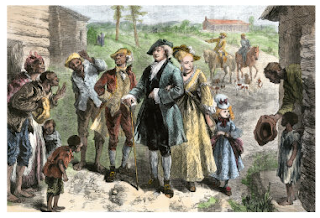The Womack family in America has its origins in the Quakerism of its progenitor. How did this impact their practice of slave holding?
Most Quakers owned slaves when they first came to America; to most Quakers "slavery was perfectly acceptable provided that slave owners attended to the spiritual and material needs of those they enslaved."i 70% of Quakers owned slaves in the period from 1681 to 1705; however, from 1688 some Quakers began to speak out against slavery until by 1756 only 10% of Quakers owned slaves.ii
Plantation Owner's Family Visiting Slave Quarters
in Colonial Virginia, 1700s
As they progressed in America Friends were succeeding in manufacturing and commerce and they also they were also becoming more concerned about social issues and becoming more active in society at large. One such issue was slavery. The Germantown (Pennsylvania) Monthly Meeting put their opposition to slavery into their minutes in 1733, but abolitionism did not become widely adopted among Quakers until its promotion by concerned members such as John Woolman. Woolman was a farmer, retailer, and tailor from New Jersey who became convinced that slavery was wrong.


Germantown Monthly Meeting of the Religious Society of Friends
Founded 1690
Before that time, some Quakers owned slaves. In general they opposed mistreatment of slaves and promoted the teaching of Christianity to them. John Woolman (1720-1772) argued that the entire practice of buying, selling, and owning human beings was wrong in principle. Other Quakers started to agree and became very active in the Abolition movement. The Philadelphia Yearly Meeting prohibited members from owning slaves in 1776.

http://trilogy.brynmawr.edu/speccoll/quakersandslavery/commentary/p...
The Quaker Meeting of Henrico was the second group started in Virginia.iii A few of these families may have been Quakers from the time of their emigration to America (e.g. Jordan, Womack), but most of these families appear to have be converted in the 1690-1730 time-frame. Some of these families were very wealthy and they were related to many of the leading families of the Virginia Piedmont. Some of the Quakers in the Henrico community who were large slave owners were moved to follow their conscience in a new direction. For instance, a John Pleasants freed over 1000 slaves on his death a few years after the Revolution.iv
We will see by examining the property tax records of Virginia Counties and the Wills of family members that the Womacks of Virginia, including Dorothy Womack’s ancestors, appear to have been more influenced by the culture of the Virginia Colony than the changes prevailing in the mainstream Quaker movement of the day and the peer pressure that may have created. Dorothy’s 4x great grandfather, her 3x great grand father in 1786 and other male and female close relatives practiced slavery and appear to have viewed it as a entitlement to all the generations of heirs to come.
In contrast, on the maternal side of her lineage, Dorothy Womacks 2x great grandfather was an ardent, practical abolitionist whose philosophy rose to prominence in the family values, priorities and character as embodied by a number of Dorothy Womacks progeny commitments to Civil Rights and social justice . How the one set of practices and beliefs migrated to the other will be a topic of central interest as we continue to examine the full scope of our ancestry.
i Wood, Betty Slavery in colonial America, 1619-1776 AltaMira Press (2005) p14
ii Fischer, David Hackett Albion's Seed: Four British Folkways in AmericaOxford University Press (1989) p601
i Wood, Betty Slavery in colonial America, 1619-1776 AltaMira Press (2005) p14
ii Fischer, David Hackett Albion's Seed: Four British Folkways in AmericaOxford University Press (1989) p601
iii Southern Quakers and slavery, a study in institutional history by Stephen Weeks
Views: 1692
Comment
© 2024 Created by IIGSExecDirector.
Powered by
![]()

You need to be a member of Genealogy Wise to add comments!
Join Genealogy Wise